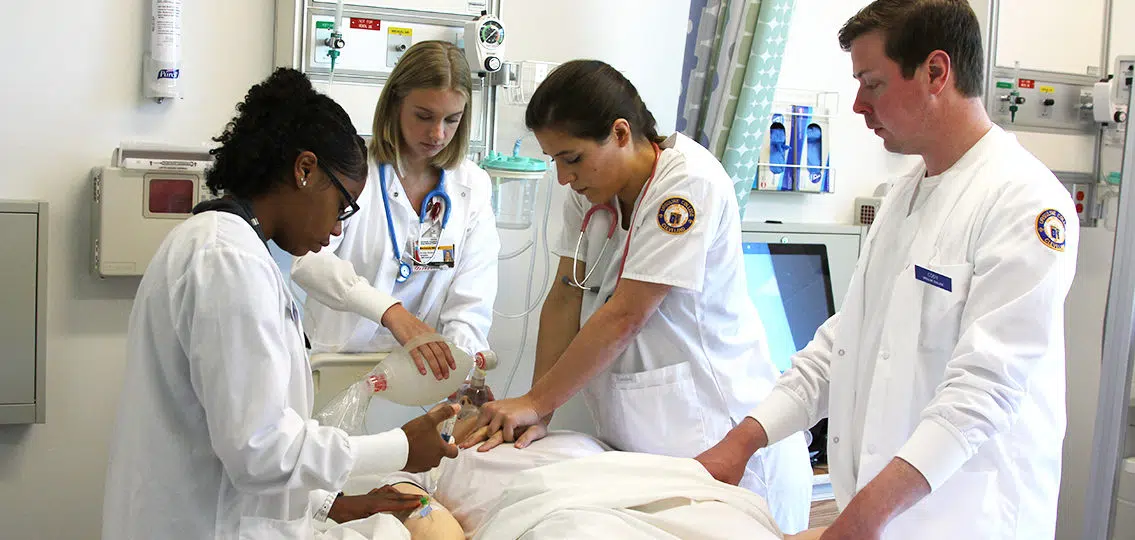With the recent emphasis on global health due to the pandemic, it wouldn’t be surprising if your high schooler is contemplating a career in the medical field. One field that is growing right now? Nursing.
In fact, nursing employment is expected to increase 9% by 2030. There’s good reason, says Patricia Sharpnack, DNP, RN, who is the dean and Strawbridge Professor at the Breen School of Nursing and Health Professions at Ursuline College and Chair-Elect of the National League for Nursing. “Nursing is a career filled with challenges, struggles and joys every day,” she says.
Over the years, I’ve seen several of my friends’ children decide to pursue this rewarding career. I have watched them take myriad paths to get there—from attending a college that has a “direct admit” nursing program to earning a master’s degree after completing their undergraduate work in an unrelated field—which certainly was a more expensive and time-consuming route.
| [adrotate banner=”243″] |
If your high schooler wants to pursue a nursing career, the good news is there are ways to ready yourself in high school to prepare for accelerated nursing programs. Here’s what to know.
How to Get into Nursing School
Advanced courses can put teens steps ahead.
There are two main types of these advanced courses. First are Advanced Placement (AP) courses that students take at their high school which offer the opportunity to earn college credit if they score sufficiently high on the national exam—and bump up their high school grade point average to boot. In addition, most states have “dual enrollment” programs that allow high school students to take community college courses for college credit.
Getting some prerequisites out of the way can allow students to lighten their course load during the first year, points out Emily Haggerty, director of admission at Ursuline College, a liberal arts college in Pepper Pike, Ohio. “They then have more time to acclimate to campus life and really dive into all their school has to offer.”
However, she cautions this is only a wise route for those who are able to take on the rigor of these courses. “If your student jumps into college credit work that’s beyond them, you run the risk of not doing well, which can impact their GPA.” She recommends initiating a conversation between the student and their high school counselor to ensure it’s an appropriate option.
The right college can open doors.
To position themselves well for a nursing career, Sharpnack recommends students focus on a school that has been named a “Center of Excellence” by the National League for Nursing, such as Ursuline. “In addition, look for colleges that have partnerships with highly acclaimed hospital systems where students can become immersed in unique clinical experiences and apprentice with the best nurses in the country,” she says.
Finally, make sure the school is accredited. Sharpnack calls this “the gold standard that speaks to ongoing quality improvement and a consistent approach to academic rigor.” For example, Ursuline’s honors program provides an opportunity for students to stretch their academic goals by working with faculty to advance an area of research, which can lead to opportunities to publish in journals or present at conferences and research symposiums.
An admissions professional can help guide you.
Since nursing students have to meet a certain number of prerequisites before starting clinical work, advanced courses can help accelerate their studies, but you need to make sure the credits will transfer. Haggerty regularly has conversations with families about their future goals. “If your child has already chosen a school, talking to an admissions counselor can be helpful since we can offer suggestions for relevant courses,” she says. And of course, it’s always smart to talk to people currently in the profession to get a clear picture of the day-to-day experience, suggests Sharpnack, adding that she is always eager to share her enthusiasm. “Not many people can finish a day’s work and truly feel they have made a difference. Becoming a nurse allows you to make a life-changing impact on both the patient and their family.”




